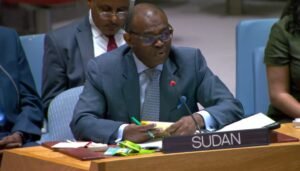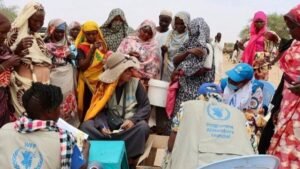“Karim Khan and Al-Harith Idris”: A Diplomatic Duel in the UN Security Council

New York – Sudanhorizon – Telal Ismail
A diplomatic duel in the UN Security Council session between the Prosecutor of the International Criminal Court, Karim Khan, and the Sudanese representative to the United Nations, Ambassador Al-Harith Idris, took place on August 5, after Khan briefed the Security Council, during which he reviewed his thirty-ninth report on the situation in Darfur, referring to reliable reports of rape crimes against children and widespread persecution against the most vulnerable civilians, stressing that “terror has become a common currency.” He warned that “this terror is not felt by those carrying guns and weapons, but by people who often flee barefoot.”
The Prosecutor – in his periodic report submitted every 6 months to the Security Council – highlighted the great efforts made in the past six months to communicate with affected communities, community leaders among Arab tribes, civil society organizations, relevant national authorities in Sudan, and international and regional organizations.
Cooperation with Sudanese Authorities
Despite the challenges, Khan stressed that the ICC is working tirelessly to ensure accountability, highlighting recent cooperation with Sudanese authorities and efforts to collect evidence from displaced persons and witnesses, noting that visas for the Court team to enter Port Sudan have been approved. The team has met with Sudanese authorities including the Attorney General and the National Committee established to investigate crimes committed in the context of the current conflict in Darfur. He added that he has received commitments from the Chairman of the Sudanese Transitional Sovereignty Council, Lieutenant General Abdel Fattah Al-Burhan, since last year to cooperate with efforts to bring justice to the victims.
“You all know that the past six months since I last reported to this Council have been six months of misery, six months of suffering, six months of horror for the people of Darfur,” Khan told the Security Council. “When I last addressed you, you may recall, I did so from N’Djamena, Chad. I heard from survivors, right on the border and in Adre, and I had the opportunity to share some of their experiences, some of their trauma, and some of their expectations of me, of the ICC, and the Council. But sadly, the past six months have seen a further deterioration. There have been credible reports of rape and crimes against children affecting them, and widespread persecution of the most vulnerable civilians in Sudan and certainly the most vulnerable people in Darfur.”

“Terror has become a common currency. It is not the people who carry guns and weapons who are terrorized, it is the people who are running around, often with nothing on their feet, and they are hungry,” he continued.
Khan said that many of the belligerents in El Geneina, El-Fasher, and across Sudan believe that they can get away with murder, rape, and atrocities, while the victims are not only waiting for the Security Council to report back every six months but are hoping for a glimmer of concern for their miserable lives, which are trying to escape to an uncertain tomorrow. That is why we need your help more than ever to ensure that this expectation of justice, for every human life that matters equally, gets some material support. Progress in a bleak place
He added: “We are making some progress in a very bleak place, I admit. It is a very bleak place in Sudan at the moment.
He called on the Sudanese government to accelerate its cooperation with the court, adding: “In the report, I mentioned some good steps, some positive steps, but of course, we need continued and deepened cooperation with the Sudanese Armed Forces, as Lt. Gen. Burhan and his government move forward. One of the concrete ways in which this commitment to accountability and this lack of tolerance for impunity can be demonstrated is through proper enforcement of the court’s orders.”
He continued: “In the course of preparing this report, visas were approved to conduct investigations. We went to Port Sudan, we met with the Sudanese authorities, including the Attorney General, we met with the national committee that was established to investigate crimes committed in the context of the current conflict in Darfur. Some requests for assistance have been acted upon, others have been partially acted upon, and others are still pending, but in my meeting with the Chairman of the Transitional Sovereignty Council of Sudan, Abdel Fattah al-Burhan, last year, I received several commitments, and I am happy that they have improved from a very low level.”
The Obstinacy of the Rapid Support Forces
The Prosecutor continued, saying: “There were significant efforts in the last quarter of 2023 and so far, to engage with the leadership of the Rapid Support Forces, and I have not seen any tangible results from those efforts, this is a place of a courtroom but also a council, it is a place where there should be no place to hide, either for people to attack the flag of justice and raise high the standard of impunity or the opposite, but because of this difficulty, we tried to reach out to other groups, including the Arab communities in Darfur, and it was not easy, there was some fear and anxiety.”

Response of Sudan’s Representative
In his response to the report, Sudan’s Representative to the United Nations, Ambassador Al-Harith Idris, after thanking the Prosecutor of the International Criminal Court for his briefing and his comprehensive report No. 39, said:
“The situation in Darfur was referred by the Security Council to the International Criminal Court, under Resolution 1593, and the previous government of Sudan refused to cooperate with the court. However, communication with the Prosecutor began following the glorious December Revolution, and resulted in the signing of a memorandum of understanding between the Government of the Republic of Sudan and the Office of the Prosecutor, in addition to taking advanced steps to join the Rome Statute establishing the International Court, in addition to legislative amendments under which the four crimes subject to the criminal jurisdiction of the International Criminal Court were included in national laws, including the Criminal Code, the Armed Forces Law, and the Procedures Law. In the context of this cooperation, the Office of the Prosecutor visited the Republic of Sudan several times.”
The representative referred to the efforts made by the Government of Sudan to further cooperation, as the Chairman of the Transitional Sovereignty Council issued a decision to form a committee to coordinate the liaison between the Government of the Republic of Sudan and the Office of the Prosecutor, headed by a judge from the Supreme Court and the membership of the relevant national bodies.
He added: “As a result of the continuous and ongoing communication between the Committee and the Office of the Public Prosecutor through various media, the Committee has prepared most of the Office’s pending requests since 2020, which amounted to 38 requests, and the Office of the Public Prosecutor of the Criminal Court commended this in writing and included this in its current report before you.” Ambassador Al-Harith stressed the ongoing cooperation, saying: “Within the framework of continuous and ongoing communication, the committee holds its meetings and responds to all requests from the Office of the Prosecutor until the end of last July, and the Government of Sudan expects similar cooperation from the court that achieves justice and fairness for the victims according to the available options to ensure Sudan’s stability, sovereignty and unity, and that the committee is ready to fulfill the requirements of the Office of the Prosecutor of the Criminal Court within the framework of constructive cooperation and in accordance with the aforementioned Memorandum of Understanding.”
Regarding the legal status and obligations of the Government of Sudan to observe international humanitarian law, Ambassador Al-Harith said that with reference to what was mentioned in the report of the Prosecutor General for the protection of civilians, we have continued to reiterate the request to support the national plan for the protection of civilians that the Government of Sudan officially submitted to the Security Council.”
Rapid Support Militia Violations
Ambassador Al-Harith mentioned the extent of the violations committed by the Rapid Support Militia since the start of the war in mid-April of last year, saying: “The militia’s hostile actions have resulted in severe damage to vital infrastructure, facilities and civilian objects, in addition to widespread looting, sabotage and systematic destruction, including Food manufacturing facilities, however, the nature of the armed forces’ operations remained defensive to repel the attacks of the unruly Rapid Support Militia, and this is a type of commitment not to escalate militarily.”
The Army’s Commitment to International Law
Ambassador Al-Harith added that the armed forces, despite the Sudanese people facing a war of aggression – agreed upon by regional and international parties – are committed to the right to self-defense and conduct qualitative military operations to reduce casualties and provide advance warnings to keep civilians away from areas of engagement and not target civilian facilities and objects, even though the militia and its foreign allies occupied citizens’ homes and displaced foreigners from the Sahel region to reside there.
He added, “A new law for the armed forces was issued under which the rules of international humanitarian law were included under the title of crimes committed by combatants during military operations, which also includes war crimes and crimes against humanity. A memorandum of understanding was also signed with the International Committee of the Red Cross to develop the rules of international humanitarian law and integrate them into the armed forces’ work systems and curricula for education and training.”
Sexual Violence
Regarding the reference to sexual violence in the Prosecutor General’s report, Ambassador Al-Harith explained, “The incidence of sexual violence has increased in areas targeted by the Rapid Support Militia as a means of destabilizing safe areas, forcing civilians into their homes, and spreading a sense of insecurity. This has included brutal violence in the states of North Kordofan, Darfur, Greater Khartoum, Al-Jazeera, White Nile, and Sennar, where these militias have invaded more than 80 villages and cities, increasing displacement and deteriorating humanitarian conditions.”

Adre Crossing
Not far from the report, the UN Security Council session witnessed demands to allow the entry of humanitarian aid through the Adre crossing on the Sudanese-Chadian border, in addition to other crossings, including the Tina crossing.
However, Sudan’s representative to the United Nations, Al-Harith Idris, told the UN Security Council: The Rapid Support Militia wants to use the “Adre” crossing in West Darfur State, on the border with Chad, to bring in weapons and ammunition under the cover of humanitarian aid.
Last month, the United States suggested that the council consider allowing aid to cross through border crossings such as Adre from Chad.
Russia’s deputy UN ambassador, Dmitry Polyansky, whose country has veto power, told the council that the international community “should not interfere in Sudan’s internal affairs under the pretext of the dire humanitarian situation, and should direct the legitimate authorities as to which humanitarian corridors should be opened.”
Some social media outlets had suggested that Russia had vetoed a resolution to force the Sudanese government to open the Adre crossing to humanitarian aid.
Shortlink: https://sudanhorizon.com/?p=846

